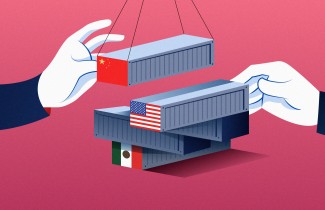When on 31 January 2020 the United Kingdom finally left the European Union there were Brexit parties up and down the United Kingdom. Only time will tell if Brexit was really a cause for celebration. From where we stand today it is hard to see any clear winners of Brexit.
The newly independent United Kingdom may eventually turn out to be the biggest loser of the process. Brexit is also bad news for the European Union. It is only symptomatic of the big changes the European Union urgently needs to make. Although Donald Trump and the US may think they are the clear Brexit winners, it remains to be seen if that is also the case longer term.
The United Kingdom is now faced with the daunting task of making a trade agreement with the European union by the end of 2020. If it is unable to reach a trade deal it can only trade with the European Union under the World Trade Organization rules. This would have a severe negative impact on trade between the United Kingdom and the European Union, its main trading partner. In economics size matters. Compared to the US, Europe, China and Japan, the UK is relatively small, relegating it to the back of the queue when it comes to negotiating future trade deals. Trade deals come with respecting the standards, rules and regulations of the biggest trading partner.
The UK is now free to choose one main trading partner. But the price of this choice is that it must realign to that partner’s standards, rules and regulation. This will make trade deals with other partners more difficult. Given the proximity and size of the European Union, a choice to realign with the European Union, resulting in handing over control over standards, rules and regulation to the European Union, is objectively the UK’s best choice.
The impact of Brexit on the UK financial services industry, with a significant client base in continental Europe, has been limited up to now. No trade deal will see more financial services activities moving from London to Europe. It is also unclear how the United Kingdom will benefit from its newly found freedom politically and in terms of security. Politically a smaller UK will carry less weight on the world stage than it did when it was still a member of the European Union. In the future the UK may fondly remember the time when it could only influence world politics through getting agreements will the difficult 27 other member states of the EU.
Turning inward also does not solve major challenges like climate change, crime, and rapid technological advancement which can only be tackled on a global level and therefore require more international cooperation rather than less. Brexit has also exposed significant differences of opinion within the United Kingdom, most notably between the different countries. As a result, the UK is bursting at the seams, and europhile Scotland could decide to look for a future as a member of the EU rather than of the UK.
One can only hope that the tears in the European Parliament when Brexit was approved on 29 January were also from the realization that it was a wake-up call for the European Union. Many people in Europe are rightly unhappy with the current workings or the European Union. The farcical Brexit process, spun out over a lengthy period of almost four years, may discourage other EU members from leaving the EU in the short term. But the European Union’s long-term challenges remain gigantic. The EU needs tough reforms to fix the democratic deficit, the eurozone, migration, and political and military defences against external threats if it is to thrive. Brexit only exposes part of these problems; it does not make solving them any easier.
In the short term it will be easier for the US to impose its political, economic and military agenda on the UK, which is smaller and weaker outside of the European Union. It fits nicely into the broader US strategy to divide and rule. Put an end to key supranational organisations and reorganise the world according to Darwinian principles, where they as the biggest and baddest nation will triumph supremely. There may be a short-term gain for the US, but in the long-term the benefits of divide and rule are a lot less certain. Historically the US is the country that has benefited more from globalisation and migration than any other country in the world. Turning back the clock, closing its borders and becoming more inward looking will most likely bring harm, not great benefit.
The main beneficiaries of Brexit in the end may be Russia and China, who are today already reaping some of the benefits of a more divided world.


